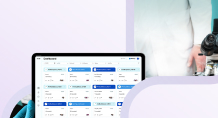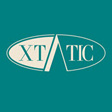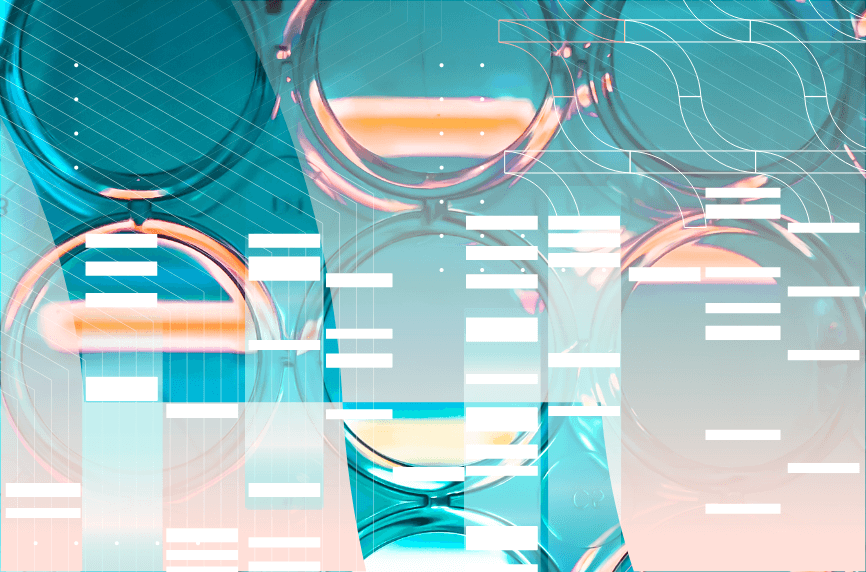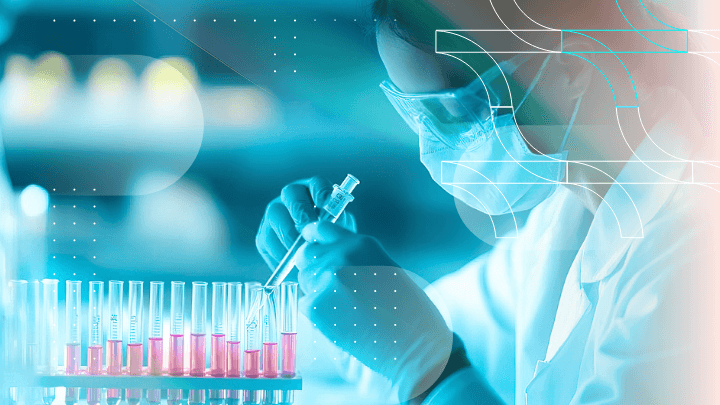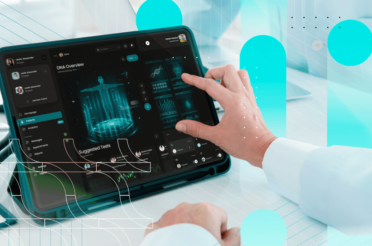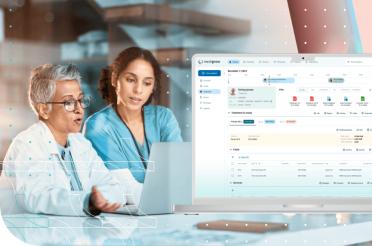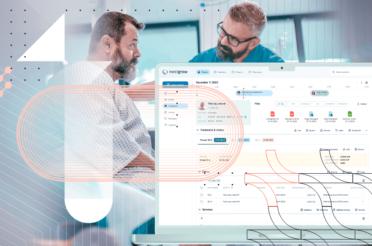Genomic data science is widely pursued as an area of interest. Humans increasingly want to explore and analyze their genomes to understand their predisposition to diseases and possibilities for prevention.
Genomics data analysis is an inevitable part of practicing personalized medicine. Although the genetic information of humans is 99.9% identical, the other 0.1% is crucial for our health, identity and future. [1]
Understanding genomics data analysis
It is not enough to just have the DNA data collected. It is even more important to analyze genomic data.
In 2003 the Human Genome Project was concluded and the whole genome was identified, mapped and analyzed. Advances in sequencing technologies like Sanger and Next-Generation Sequencing (NGS) have enabled the identification of genome variants.
Detecting these variants has become routine, however, understanding their function remains a major challenge for doctors and scientists. Some variants can cause diseases or disorders, some are benign. Data generated from sequencing is stored in genomic data storage.
Large-scale functional genome analysis, involving genomics, epigenomics, transcriptomics, and other fields, is essential for diagnostics and developing treatments. Limitations in analysis lead to abnormal interpretation and improper diagnosis. [1]
Genomics data analysis tools
For data to be studied, it has to be obtained first. Genomic information comes from sequencing technologies.
Some of them are:
- Next Generation Sequencing (NGS) revolutionized the genetics field. It is a technology that is used to determine the sequence of the building blocks of DNA or RNA – the nucleotides. This technology does parallel sequencing of millions of small DNA fragments. The method is high quality and requires a low amount of genetic material samples for testing. [1,2]
- Genome-wide association studies (GWAS) is a gene mapping study – it identifies the precise location of genes and makes associations between genetic variants and common diseases. It also identifies risk alleles and has a predictive value. Correlation does not always mean causation so GWAS can have limitations in diagnostics. This tool has the phenomenon of linkage disequilibrium – gene variants are not the cause of the genetic disease but are located near the accountable gene and tend to be inherited together. [2]
- The Database for Annotation, Visualization and Integrated Discovery (DAVID) is a bioinformatics tool for gene list analysis. This Knowledgebase and functional analysis resource has gene and protein identifiers as well as functional annotation tools for understanding the biological meaning behind large lists of genes. [3]
- Galaxy is a web-based, open-source platform. It is designed to integrate over 8000 tools into one. This includes tools for read alignment of the genetic information, variant calling and others. Galaxy eases genomic data sharing and workflow management as its users can freely share information and manage large datasets. [4]
All of these help the genomic data collected to be analyzed and even interpret genomic data with cutting-edge computational methods.
Discover how we can help outsource Healthcare projects efficiently Speak to an expert today, and see how our on-demand IT talent and augmented teams can efficiently deliver value at every step of your roadmap.

Challenges in genomics data analysis
The technology of analysis and interpretation has its limitations and challenges to meet the expectations of modern-day medicine.
The first challenge is the extent of the predictive value of the analysis. It is easy if we think that one gene causes one disease, however many conditions have complex genetic and environmental risk factors. Some huge mutations can be observed but can not be linked to a disease. Other little mistakes in DNA can cause severe illness. Some genes have different gene expressions which means that their presence can remain hidden for a long time.
The interpretation becomes even harder in population screenings without having a family history. Bias from family data and incomplete knowledge of mutation penetrance complicate clinical interpretation, making genetic testing in broader populations more challenging. We need large-scale genotype-phenotype linkages and systematic catalogs to advance our understanding of genetics. [5]
Moreover, genomic data governance is a challenge. The rise of advanced technologies in genomics has brought challenges such as legal, ethical, and privacy violations.
This means that a framework for privacy is needed to keep this personal health information safe. Security breaches from cyber-threats violate regulations such as GDPR. In-depth analysis and reliable systems for controlled access should be used to provide safety and privacy. [6]
Next-generation sequencing in genomics data analysis
Next-generation sequencing is involved in different aspects of health work. The first step of using NGS is determining the questionable genetic mutations we are looking for. In cancer patients, particular mutations of genes are identified depending on the malignant process in the body. Different panels of NGS are available for the variable gene panels that are investigated.
Interpretation of NGS could be difficult. Results from the same gene variants may vary in different individuals. Some gene variants’ clinical significance is yet to be explored. A practical approach must be introduced – to follow established guidelines, such as the National Comprehensive Cancer Network (NCCN) guidelines and others. Updates from the literature and Internet databases are daily and should be explored.
Next-generation sequencing is an amazing tool for healthcare workers because its use is not limited to diagnosis. NGS can also be helpful in identifying mutation targets for targeting therapy. It also can identify populations at high risk for certain hereditary cancers.
NGS is used in the “liquid biopsy” method in which tumor DNA is searched in the blood of the patient. This multifunctionality helps NGS to be established as a great contribution to personalized and precision medicine. [7]
Bioinformatics and genomics data analysis
Bioinformatics is a field where molecular biology, computer science, mathematics, and statistics are merged to exceed the possibilities of medicine. It provides tools and techniques for analyzing, interpretation and management of genomic data.
Bioinformatics tools for genomic analysis include the following:
- Tools for DNA sequence alignment: algorithms that align the specific genome to the reference genomes;
- Phylogenetics: tools for the construction of evolutionary trees;
- Functional annotation: algorithms for predicting the product of the gene and its function;
- Structural biology: tools for analysis of biomolecular structures.
Cooperation between medical sciences and bioinformatics is the backbone of the innovations in genomic analysis. [8]
Applications of genomics data analysis
Genomics data can be informative in many different ways.
First, it is usually used in the diagnosis and classification of diseases. This includes diagnosis of inherited disorders based on single-gene mutations, such as cystic fibrosis. Genome analysis is important for prenatal panel testing for inherited disorders. Genes define and classify tumors in different subgroups.
Secondly, genetic data can be used for treatment guidance. It shows specific genetic variation in cancer patients for choosing target therapy. Also, some gene variations are associated with the metabolism of medications. These variants should be known so that adverse reactions are prevented.
Last but not least, genetic data analysis is used for screening the population and determining the hereditary risk. Examples of this are the BRCA1 or BRCA2 genes that are linked to breast and ovarian cancer. Identification of inherited cancer risk is crucial for optimal prophylactics. [9]
Integrative genomics data analysis
Integrative genomics data analysis involves combining multiple types of genomic data, such as DNA sequence, RNA, epigenetics, and others, to gain a comprehensive understanding of biological systems and processes.
This innovative approach allows scientists to explore how different layers of genetic information interact and contribute to phenotypic traits, disease states, and other biological conditions. Unlike traditional genomics analysis, which focuses on a single data type, for example, DNA mutations, integrative genomics seeks to provide a more complete view by considering data from multiple sources simultaneously.
This is very important in the field of cancer research and precision medicine. [10]
Future trends and impact on research and medicine
New applications and innovations in genomics analyses are emerging every day and will continue. Resources are directed towards a diagnosis of some atypical forms of common diseases and wider genome analysis of pharmacogenetics and genetic blood tests.
Moreover, there is a possibility for risk profiling for common diseases using polygenic risk scoring (PRS) and an update of the screening guidelines. We are hopeful that the next decade will be productive for data scientists and researchers. [9]
In conclusion, genomics data analysis has become a cornerstone of modern biological and genomics research as it offers the genetic foundations of life, disease, and evolution.
With the rise of high-throughput technologies like Next-Generation Sequencing (NGS), the ability to process and interpret vast amounts of human genomic data has expanded, enabling personalized medicine and cancer treatment to grow more sophisticated.
This field also faces significant challenges, including managing the massive scale of data, ensuring accuracy, and others. Maintaining the balance between the need for medical genetics and the increasing innovation in devices, methods and software tools for analysis is crucial.
Whether you’re a startup, a Fortune 100 company or a government organisation, our team can deliver a solution that works for you. BGO Software
Sources
[1] Gasperskaja E, Kučinskas V. The most common technologies and tools for functional genome analysis. Acta Med Litu. 2017;24(1):1-11. doi: 10.6001/actamedica.v24i1.3457. PMID: 28630587; PMCID: PMC5467957.
[2] Pattan V, Kashyap R, Bansal V, Candula N, Koritala T, Surani S. Genomics in medicine: A new era in medicine. World J Methodol. 2021 Sep 20;11(5):231-242. doi: 10.5662/wjm.v11.i5.231. PMID: 34631481; PMCID: PMC8472545.
[3] Sherman BT, Hao M, Qiu J, Jiao X, Baseler MW, Lane HC, Imamichi T, Chang W. DAVID: a web server for functional enrichment analysis and functional annotation of gene lists (2021 update). Nucleic Acids Res. 2022 Jul 5;50(W1):W216-W221. doi: 10.1093/nar/gkac194. PMID: 35325185; PMCID: PMC9252805.
[4] Giardine B, Riemer C, Hardison RC, Burhans R, Elnitski L, Shah P, Zhang Y, Blankenberg D, Albert I, Taylor J, Miller W, Kent WJ, Nekrutenko A. Galaxy: a platform for interactive large-scale genome analysis. Genome Res. 2005 Oct;15(10):1451-5. doi: 10.1101/gr.4086505. Epub 2005 Sep 16. PMID: 16169926; PMCID: PMC1240089.
[5] Lucassen A, Houlston RS. The challenges of genome analysis in the health care setting. Genes (Basel). 2014 Jul 22;5(3):576-85. doi: 10.3390/genes5030576. PMID: 25055201; PMCID: PMC4198918.
[6] Saadia Arshad, Junaid Arshad, Muhammad Mubashir Khan, Simon Parkinson, Analysis of security and privacy challenges for DNA-genomics applications and databases, Journal of Biomedical Informatics, Volume 119, 2021, 103815, ISSN 1532-0464, https://doi.org/10.1016/j.jbi.2021.103815.
[7] Qin D. Next-generation sequencing and its clinical application. Cancer Biol Med. 2019 Feb;16(1):4-10. doi: 10.20892/j.issn.2095-3941.2018.0055. PMID: 31119042; PMCID: PMC6528456.
[8] Asad, Qaiser & Shabir, Ghulam. (2023). Bioinformatics and Big Data Analytics in Genomic Research. 10.13140/RG.2.2.23999.28329.
[9] https://www.ncbi.nlm.nih.gov/books/NBK569502/
[10] Kristensen, V., Lingjærde, O., Russnes, H. et al. Principles and methods of integrative genomic analyses in cancer. Nat Rev Cancer 14, 299–313 (2014). https://doi.org/10.1038/nrc3721

